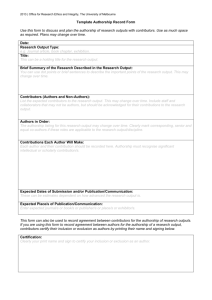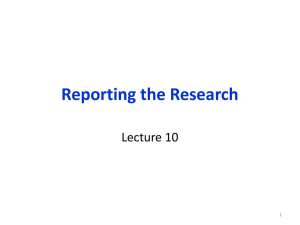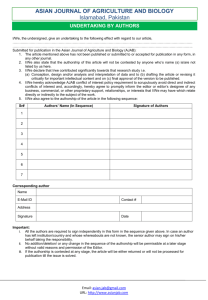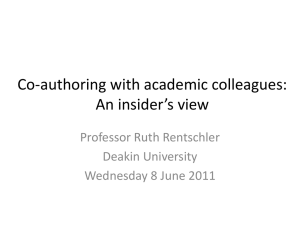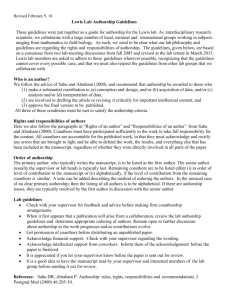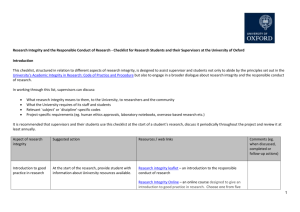a very basic template - Office for Research Ethics and Integrity
advertisement
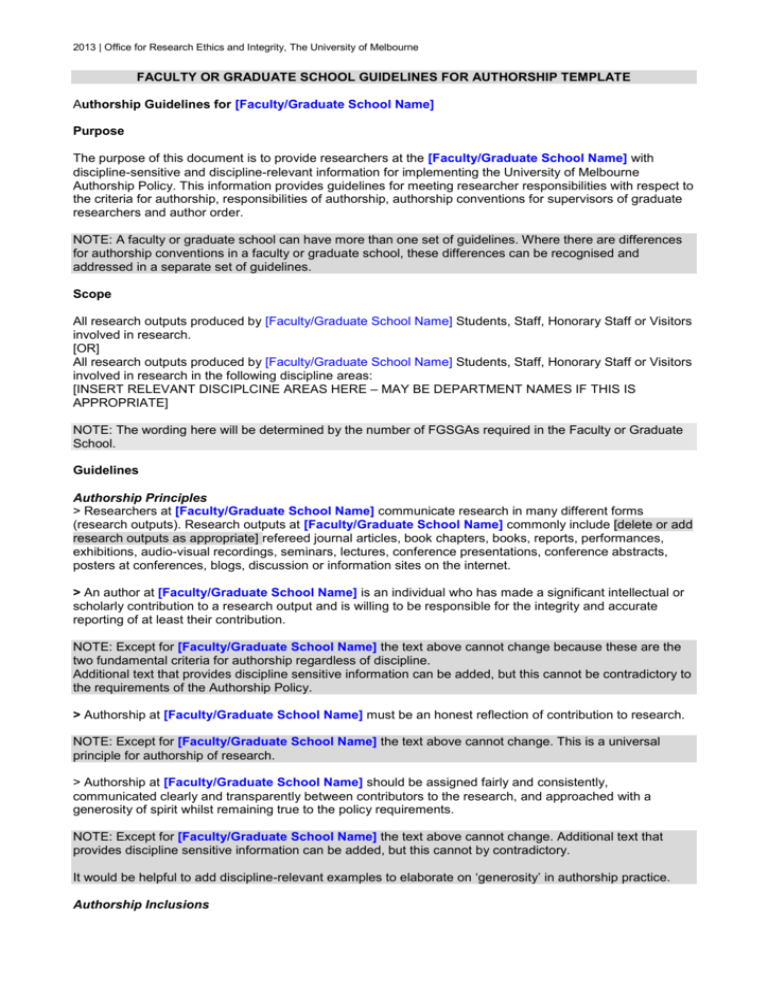
2013 | Office for Research Ethics and Integrity, The University of Melbourne FACULTY OR GRADUATE SCHOOL GUIDELINES FOR AUTHORSHIP TEMPLATE Authorship Guidelines for [Faculty/Graduate School Name] Purpose The purpose of this document is to provide researchers at the [Faculty/Graduate School Name] with discipline-sensitive and discipline-relevant information for implementing the University of Melbourne Authorship Policy. This information provides guidelines for meeting researcher responsibilities with respect to the criteria for authorship, responsibilities of authorship, authorship conventions for supervisors of graduate researchers and author order. NOTE: A faculty or graduate school can have more than one set of guidelines. Where there are differences for authorship conventions in a faculty or graduate school, these differences can be recognised and addressed in a separate set of guidelines. Scope All research outputs produced by [Faculty/Graduate School Name] Students, Staff, Honorary Staff or Visitors involved in research. [OR] All research outputs produced by [Faculty/Graduate School Name] Students, Staff, Honorary Staff or Visitors involved in research in the following discipline areas: [INSERT RELEVANT DISCIPLCINE AREAS HERE – MAY BE DEPARTMENT NAMES IF THIS IS APPROPRIATE] NOTE: The wording here will be determined by the number of FGSGAs required in the Faculty or Graduate School. Guidelines Authorship Principles > Researchers at [Faculty/Graduate School Name] communicate research in many different forms (research outputs). Research outputs at [Faculty/Graduate School Name] commonly include [delete or add research outputs as appropriate] refereed journal articles, book chapters, books, reports, performances, exhibitions, audio-visual recordings, seminars, lectures, conference presentations, conference abstracts, posters at conferences, blogs, discussion or information sites on the internet. > An author at [Faculty/Graduate School Name] is an individual who has made a significant intellectual or scholarly contribution to a research output and is willing to be responsible for the integrity and accurate reporting of at least their contribution. NOTE: Except for [Faculty/Graduate School Name] the text above cannot change because these are the two fundamental criteria for authorship regardless of discipline. Additional text that provides discipline sensitive information can be added, but this cannot be contradictory to the requirements of the Authorship Policy. > Authorship at [Faculty/Graduate School Name] must be an honest reflection of contribution to research. NOTE: Except for [Faculty/Graduate School Name] the text above cannot change. This is a universal principle for authorship of research. > Authorship at [Faculty/Graduate School Name] should be assigned fairly and consistently, communicated clearly and transparently between contributors to the research, and approached with a generosity of spirit whilst remaining true to the policy requirements. NOTE: Except for [Faculty/Graduate School Name] the text above cannot change. Additional text that provides discipline sensitive information can be added, but this cannot by contradictory. It would be helpful to add discipline-relevant examples to elaborate on ‘generosity’ in authorship practice. Authorship Inclusions 2013 | Office for Research Ethics and Integrity, The University of Melbourne > Authorship at [Faculty/Graduate School Name] is attributed only when a researcher has made a significant intellectual or scholarly contribution to a research output and is willing to take responsibility for the contribution. Researchers qualify as authors if they have made a significant intellectual or scholarly contribution through at least one, but often more than one, of the following: >> Conception and design of the research described in the research output, >> Acquisition of research data where the acquisition has required significant intellectual judgement or input, >> Analysis and interpretation of research data, >> Drafting of the research output, or redrafting the research output so as to critically change or substantively advance the interpretation.. NOTE: Please consider the meaning of ‘acquisition of data’ for the disciplines covered in this guideline e.g. what types of data might meet the requirement for significant intellectual judgement or input? For example, would collecting research papers and preparing a literature review of these papers be considered sufficient? Would running 100 NMR samples? Recruiting patients to a clinical trial? Consider specific ways in which a contribution in one of these five areas might be made, e.g. the making of unique instruments for the research described in the research output. Add your own list here. Authorship Exclusions > Authorship at [Faculty/Graduate School Name] must not be attributed when a researcher has not made a significant intellectual or scholarly contribution to a research output or is unwilling to take responsibility for their contribution. NOTE: Add your own list here. Contributions made solely through the provision of funding, the provision of technical support or advice or assistance, their position or as a gift, the provision of research data or materials or infrastructure (access to equipment), are generally not considered to meet the criteria for authorship. Consider contributions that do not meet the authorship criteria, but provide some discipline specific context to the examples listed above. Recording Authorship > Authorship for supervisors of graduate researchers at [Faculty/Graduate School Name] aligns with discipline tradition and convention i.e. supervisors of graduate researchers are not typically included as authors on research outputs by student researchers. Where exclusion of a supervisor is aligned with disciplinary practice, a record of this exclusion is not required. In all other cases, a person who qualifies as an author must not be included or excluded without their written agreement and a record of this agreement must be kept. [OR] > A person who qualifies as an author must not be included or excluded without their written agreement and a record of this agreement must be kept. Authorship for supervisors of graduate researchers at [Faculty/Graduate School Name] aligns with discipline tradition and convention i.e. supervisors of graduate researchers are typically included as authors on research outputs by graduate researchers provided that a significant intellectual contribution has been made. NOTE: Delete the paragraph that does not apply. > Authors included on research outputs must describe their contribution in writing and this must form part of the agreement. Research outputs with multiple authors > Nominate a corresponding author (even if this is not published). The corresponding author is responsible for communication between the publishers and managing communication between the co-authors. The corresponding author must maintain records of authorship agreement. NOTE: Modify the points below to provide further discipline specific advice for research outputs with multiple authors. Delete those that do not apply. > Nominate a senior author where this is customary. The senior author’s role is normally to have overseen the research and to attest to the integrity and accuracy of the research as a whole. 2013 | Office for Research Ethics and Integrity, The University of Melbourne > Advice for determining author order where relevant. In the disciplines covered in these guidelines, is first author important? Is author order alphabetical? Does it reflect relative contribution to the research? Is the senior author usually last on the authorship line? >Advice for determining equal co-authorship. Sometimes, authors who have contributed equally to the work should be recognised as equal co-authors (for example, equal first authors). How is this determined in the disciplines covered by this guideline? Timeliness > Timeliness is important. Delays in providing feedback or comments about a draft research output can sometimes initiate authorship disputes. NOTE: What is a reasonable timeframe for authors to provide responses to communications about a research output? Please add this discipline sensitive information. Resolving Authorship Disputes > Disputes about authorship should be resolved using the Authorship Dispute Resolution Procedure. > For the [Faculty/Graduate School Name] the [insert position title] shall act as the Senior Academic who mediates dispute resolution. NOTE: The Senior Academic may be the relevant Heads of Department or School, the Associate Dean (Research), the Associate Dean (Research Training) or some other Senior Academic. Our preference is for Heads of Department or School because Associate Deans may be involved in other processes if mediation fails. Resources [Link to OREI website] Authorship at Melbourne Resources provided by the Office for Research Ethics and Integrity: > Authorship Policy > Authorship Procedure > Authorship Dispute Resolution Procedure > Template Authorship Record Form
